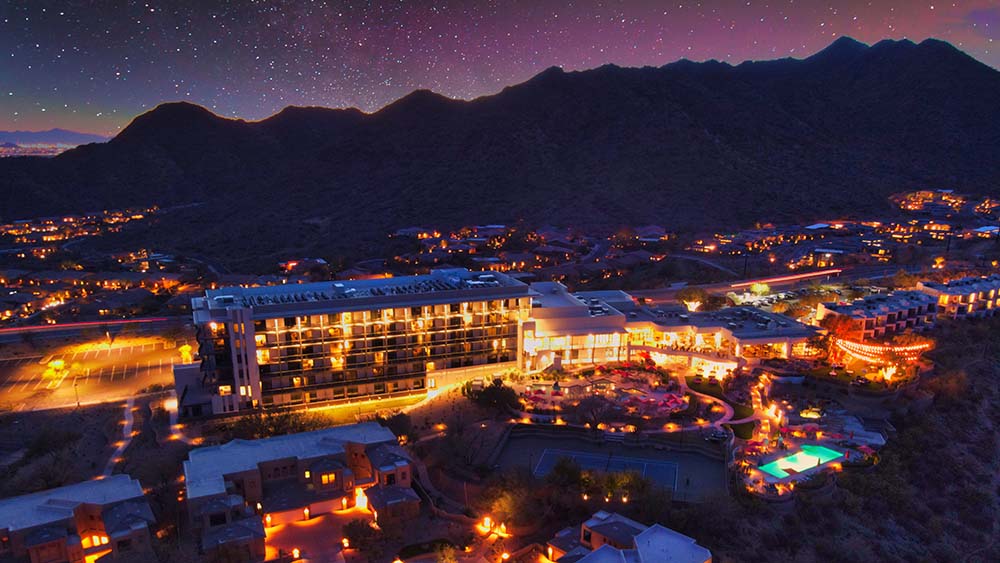
Adero Scottsdale, a resort located in a certified Dark Sky community, offers unparalleled stargazing opportunities to groups — one example of the kinds of “academic adventures” Wunderman Thompson has identified as a 2022 trend. (Courtesy of Aqua-Aston Hospitality)
Throughout the pandemic, many of our lifestyles, priorities, and ways of working have dramatically changed. In its report “The Future 100: 2022,” creative agency, consultancy, and technology company Wunderman Thompson has identified 100 trends across industries — from culture to health to travel and hospitality — that will shape the way we live and work this year and beyond. The Convene editors have each chosen three trends from Wunderman Thompson’s report and connected them to meetings and events. Up next, Editor in Chief Michelle Russell takes on academic adventures, liminal spaces, and the great reskilling.
Academic Adventures
In a way, conferences are their own kind of academic adventures. But this trend is specifically about expert-led experiences offered by hospitality groups and informational brands. For example, last year NPR media launched NPR Travels, immersive and educational trips with a National Public Radio slant. Participants on an NPR Travels journey through Iceland in July will explore the forces of nature — waterfalls, geysers, and black-sand beaches — as well as take exclusive tours of Iceland’s hydroelectric and geothermal power plants to see how the country runs almost entirely on renewable energy. Another example provided by Wunderman Thompson: Adero Scottsdale offers Dark Sky Zone experts who can guide guests through the constellations with binoculars and high-powered telescopes while sipping “astro-cocktails” on the hotel’s SkyTop Lounge.
It’s a vacation version of the knowledge economy approach to events, in which an event leverages its destination’s assets that align with their group’s interests or profession — like a tour of a state-of-the-art hospital in a city hosting a medical conference.
As potential attendees weigh more heavily than in pre-pandemic days whether to travel for a face-to-face event, how can you go all in on the immersive experiences the destination offers — to enhance the conference’s educational program and make for a more memorable “had-to-be-there” event?
Related: Under One Sky Conference Finds Bright Spot in Move to Digital
Liminal Spaces
Earlier this year, event industry speaker and author Julius Solaris talked about how liminal spaces — transitional areas such as corridors, hallways, elevators, and escalators — enable serendipitous connections at in-person events in a contributed Convene column. He recommended that event organizers design for planned serendipity at virtual events to replace the physical liminal spaces at in-person events, like a listen party with a DJ or a breakout room on mental health during an engineering event.
Wunderman Thompson’s take on liminal spaces is a mashup of virtual and physical. Pixel Canvas is a browser-based, 3D, interactive platform that creates these kinds of liminal networking spaces in the metaverse as well as 3D and 2D exhibit halls. “In 3D,” according to Pixel Canvas’ website, “collaborative activities, interactive product demos, and exhibit booths can come to life and keep your attendees staying for hours instead of minutes.”
Wunderman Thompson illustrated how physical spaces can be augmented with digital tools with this example: Visitors to Manhattan’s High Line park last summer used an app, Acute Art, to view hidden interactive artwork in “The Looking Glass,” an augmented reality installation of virtual sculptures created by a collaboration between High Line Art and westside cultural institution The Shed.
Both examples raise two questions for event organizers: How can you make digital events a more immersive experience and how can you enhance participants’ experience at physical events with digital tools?
The Great Reskill
The business events industry doesn’t need Wunderman Thompson to point out how the pandemic has accelerated the digital revolution. But what’s interesting is the way this trend is presented, which bodes well for the business events industry: “As the digital revolution races on, brands are realizing that the fastest and most effective way to keep pace is to upskill their existing workforce. Where specialized college or graduate degrees may once have been a prerequisite, companies are now encouraging employees to learn as they go.” One example: Levi Strauss & Co’s digital upskilling initiative for employees, the Machine Learning Bootcamp, is an eight-week, full-time, paid program that teaches, among other skills, how to code. Rachel Carlson, cofounder and CEO of Guild Education, predicts professionals will have to learn some sort of new skill every four years.
If the foundation of conferences and conventions is continuing education, how can you rethink your offerings —online and in-person — to also provide digital upskilling in ways that connect to your main areas of concentration?
Michelle Russell is editor in chief of Convene.
